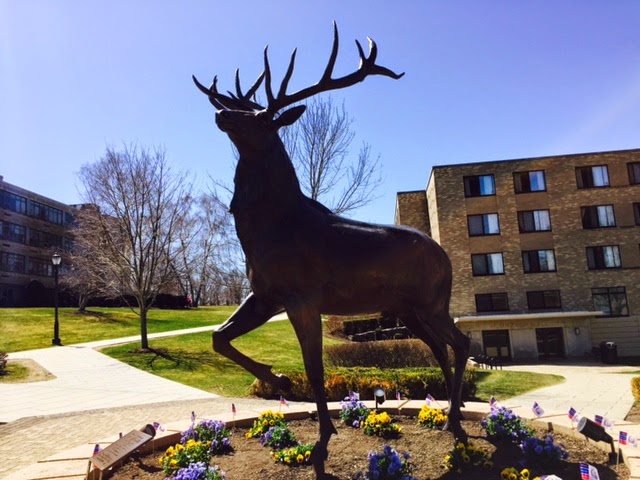As all of the seniors
are in the busiest part of the college admissions process, I’m sure most people
are counting down the days until they are finished with completing
applications, writing essays, finalizing the college list, and paying for those
application fees! Juniors most likely are just beginning to explore what
colleges are out there and are beginning to think about what and where they
want to study during their four years of higher education. Wherever you are in
the college search and application process, I think it is always good to hear
about more schools you may not have thought about. I recently was able to be
part of a 2-day, 3-college tour with counselors from across the country. During
the trip, we visited Wheaton College, Emerson College, and Providence College.
These three very different colleges were an absolute joy to visit, and I want
to share some information with you on all three of these schools. Trust me,
there are some schools I would not recommend to my students, but all three of these
are colleges I would strongly recommend for a variety of reason. Enjoy the
following information and pictures, and as always, happy searching!
Wheaton College: This
is a small liberal-arts college of 1,600 students in Norton, Massachusetts,
which is a small town about 40 minutes outside of Boston and 25 minutes outside
of Providence. It was originally founded in 1834, as an all-girls school, and
only became co-ed in 1988. It is now pretty even with the amount of men and
women that attend the school. Wheaton’s big theme is that they are a “connected”
school. They are connected in many ways including the close relationships between
faculty and staff and regardless of major; students’ courses are connected, as
there are many interdisciplinary courses. Even their academic advising and
career center housing is connected, with the idea being that career readiness
begins day one of college, and Wheaton will work closely with all of the
students throughout the academic and career process. Two courses that all
students must take include an extensive freshman writing course and a ‘Beyond
the West’ history course where students learn about history of countries west
of the United States and Europe. Wheaton College also has a new Business and
Management major, and all business majors must select a liberal-arts
concentration to go along with the major.
Overall, I was impressed
with Wheaton as a solid academic institution. They are very much a liberal-arts
focused school, and their graduates have a variety of skills entering the work
force. It is a small campus, but is beautiful. Wheaton is pretty much what I
think of as a small, New England college. There is not a lot happening around
the campus, but the school always has events going on for students to stay
busy. The campus is also a short ride to both Boston and Providence, for
students who want to visit the city on the weekends. Overall, this is a school
where I know students are taken care of, guided in the right direction, and are
given amazing opportunities, but they are also granted a great deal of freedom
and responsibility. For students looking for a small school, with strong
academics in the Northeast, you definitely want to give Wheaton College a look.
Here are some quick
admissions facts on the school: Both Early Action and Early Decision (11/15
deadline) are available, and their regular decision deadline is 1/1. For
students applying early decision, Wheaton’s financial aid office will do an
early read for them. They are looking for students with a 3.4 GPA or higher
(mid-high 80s) and 1100-1200 on the SATs or a mid-50% in ACTs of 26-31.
However, Wheaton is a Test Optional School, so students do not have to send in
their scores if they do not want to. They offer merit scholarships that range
from $5,000 to $20,000 and $30,000 per year is given out in need based
financial aid. The average student will receive about $32,000 in need based
aid. Finally, about ½ of the students that attend Wheaton College are from New
England, and 14% of their students are international, which is quite a big
number for such a small school.


Emerson College: Emerson
College is located in downtown Boston and is a very urban campus. The campus is
comprised of 12 buildings in a 2 block radius; with many of the buildings
having 10 floors or more of classrooms and production facilities. Emerson is
comprised of 3,700 students and they are all about the communications and arts.
Emerson is the only college in the country that concentrates on communications
and arts in a liberal arts focus. They have a liberal arts core, which consists
of 14 courses in addition to their major and electives. Their two main schools
are School of Communications, which
houses majors such as Communication Sciences and Disorders, Communication
Studies, Marketing Communication, and Journalism and their School of the Arts, which houses majors such as Performing Arts,
Visual and Media Arts, and Writing, Literature, and Publishing. Emerson has an Honors Program, which accepts
about 50-60 students each year, and they receive a ½ tuition scholarship.
Emerson has amazing technology throughout the building, with performing arts
studios, music and video production facilities and more. Students have access
to the equipment from day one, and the opportunities they are given are hard to
be rivaled from any other school in the country. Emerson also has a campus in
LA, where many of their School of the Arts students will go for a semester or a
year. Emerson is one of the few schools where some of their students have red
carpet access at many of the most famous award shows in LA. Although there is
not a lot of green space on the campus, Emerson is located right next to the
Boston Common, which is one of the country’s oldest parks. It is an absolutely
beautiful park, and many of the Emerson dorms have views of the park. Emerson
is a great place for students interested in communications, journalism, or
performing arts and those looking to be in a city setting. Although not as busy
as New York City, this city campus has a ton going on, and is definitely worth
a closer look for students.


Providence College: Providence College is a lovely liberal arts college
located in Providence, Rhode Island. The school has about 4,200 undergraduates
and is located about 1 mile
from downtown Providence. The campus is beautiful with a ton of green campus
spread throughout, but is very manageable to walk from one end to the other.
Providence College has over 100 clubs and activities and intramurals are huge
on their campus. Most students will say that winning an intramural champion
t-shirt is the most coveted prize on campus. Providence is run by the Dominican
order, and its Catholic identity is very important to the school. However, PC
welcomes students from all faiths and backgrounds. PC has four important areas
for students and staff to follow, which are contemplation & communication,
cultural agility, integrated learning, and human flourishing. Volunteer and
community service is extremely important at PC, with the majority of their students
partaking in this during their time in school. Career education and preparation
is also a big part of their culture. Career education starts at orientation,
where students will do journal exercises to help with the planning of their
future. Alumni are integral parts of their community with helping current
students receive internships and jobs. Each year, Providence College hosts
networking nights in Providence, Boston and New York City, and will be offering
for the first time this year, a trip to LA for theatre students to network. The
most recent numbers for the graduating class of 2013 produced that 6 months
after graduating, 98% of the students were employed or in graduate school.
Although Biology is PC’s
number one major currently, the business school at Providence is booming and is
on the road to becoming one of the best in the country. It recently moved up 38
spots in the rankings for business schools. Ground will be broken on a new
60,000 square foot business building within the year, which will provide a beautiful
space for all business students to learn. After touring the campus, talking
with current students and staff, I feel that Providence College can be a hit
for a variety of students. This is a school that obviously cares about its
students and wants to make sure that all students receive an amazing education
and are ready to be successful in their personal and professional lives, and
make a real difference in the world.
The following are just
a few admissions facts and numbers: This year, PC’s early action applications
increased 600 from the previous year, which is indicative of the ever
increasing selectiveness of the school. Right now they have a 55-59% admission
rate, and strength of schedule is very important to their counselors.
Providence College is a test-optional school, and 35-40% of their applicants
choose not to submit their scores.
-Joseph D. Korfmacher, MA












